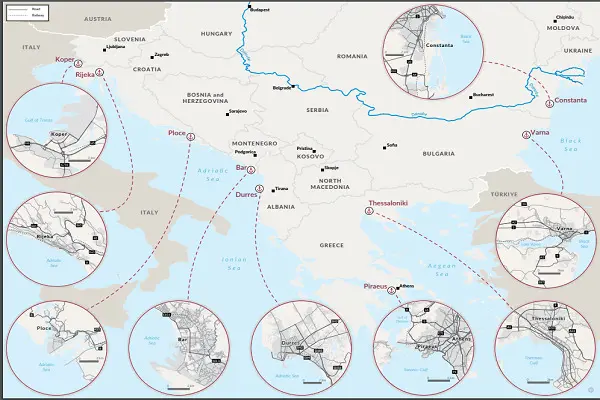Container ports in south-eastern Europe are increasingly vulnerable to trafficking of illicit goods, is said in the report titled “Portholes: Exploring the maritime Balkan routes”, released today by the Global Initiative Against Transnational Organized Crime.
Highlighting the many major seizures of cocaine, heroin and cigarettes since 2018, the authors suggest that the traditional “Balkan route” for trafficking across land is supplemented by maritime routes to ports in the Adriatic, Aegean and Black seas.
“There seems to be a shift in trafficking patterns”, states co-author Walter Kemp.
“Because of measures designed to restrict migration flows and COVID; the displacement effect of major seizures of cocaine in Belgium and the Netherlands; and disruption caused by war in Ukraine, traffickers are looking for alternative routes”.
Major seizures of cocaine – usually concealed in boxes of bananas – in ports such as Durres (Albania), Ploce and Rijeka (Croatia), and Thessaloniki (Greece) have stirred suspicion that south-eastern European ports are becoming more attractive for traffickers. This has been compounded by major seizures of heroin in the ports of Constanta (Romania), Koper (Slovenia) and Varna (Bulgaria) as well as the long-standing problem of cigarette smuggling, particularly through the ports of Bar (Montenegro) and Piraeus (Greece).

The conclusions are based on case studies of these nine commercial ports in the region, and the report follows the main trafficking routes and explains the concealment techniques used. The report also looks at the ecosystem of ports and their vulnerabilities, and describes the criminal actors who operate in and around the ports.
“In some ports, there seem to be cells of criminal groups that operate as part of wider transnational networks”, says lead author Ruggero Scaturro.
“Several ports are crime magnets, not only attracting local criminal groups but also those from land-locked countries that need an outlet to the sea. Increased investments in infrastructure will make the Balkan ports more attractive for business – legal and illegal. Therefore, it is important to improve the security of the regional ports, as well as to increase cooperation between law enforcement authorities along the Balkan maritime route”, he adds.
The report notes that the security of the ports in south-eastern Europe has improved in the past decade due to greater investments in technology, harmonization with international security standards, as well as support and training from organizations such as the UN Office on Drugs and Crime and EUROPOL, and bilateral assistance. But like in other ports around the world, the technical improvements sometimes are negated by corruption. The report, at the same time, highlight the vulnerability of the Danube river to illicit trade.
“It seems that the Danube is a ‘blind spot’ and it deserves greater attention, especially due to the potential for fuel smuggling”, says Kemp.
“The threat of illicit markets around the Black Sea should encourage closer regional cooperation with the main goal being law enforcement”, he suggests.
The authors, additionally, recommend greater cooperation between port managers, police, ship companies and customs agencies along the well-known illicit trade routes, for example between Latin America, Western Europe and the Western Balkans.
“We need to move from just looking at the port security to monitoring and disrupting transnational flows”, concludes Scaturro.
M.D.
Translation: N. Cvetkovska

